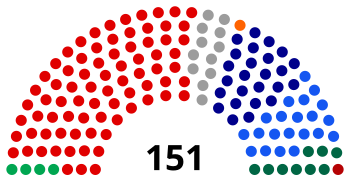| 47th Parliament of the Commonwealth of Australia | |
|---|---|
46th ← → 48th | |
 | |
26 July 2022 – 28 March 2025 | |
| Members | 76 senators 151 representatives |
| Senate Leader | Penny Wong, Labor (from 23 May 2022) |
| Senate President | Sue Lines, Labor (from 26 July 2022) |
| House Leader | Tony Burke, Labor (from 1 June 2022) |
| House Speaker | Milton Dick, Labor (from 26 July 2022) |
| Sessions | |
| 1st: 26 July 2022 – 28 March 2025 House Composition (at dissolution)
Senate Composition (at dissolution)
| |
The 47th Parliament of Australia was a meeting of the legislative body of the Commonwealth of Australia, composed of the Australian Senate and the Australian House of Representatives. The May 2022 federal election gave the Australian Labor Party control of the House, with 77 seats, enough for a two-seat majority government. [1] Labor gained an additional seat at the Aston by-election in April 2023, thereby increasing its majority to three seats for much of the remainder of the term. [h] Following the election, Labor leader Anthony Albanese became the 31st Prime Minister of Australia, and was sworn in by the Governor-General David Hurley on 23 May 2022. [2] The 47th Parliament opened in Canberra on 26 July 2022. [3] The term ended on 28 March 2025, when the House of Representatives was dissolved and parliament was prorogued by Governor-General Sam Mostyn, in preparation for the 2025 federal election. [4]
Contents
- Major events and legislation
- Parliamentary conduct
- Leadership
- Senate
- House of Representatives
- Party summary
- House of Representatives 2
- Senate 2
- Demographics
- Senate 3
- House of Representatives 3
- Membership
- Senate 4
- House of Representatives 4
- Changes in membership
- Senate 5
- House of Representatives 5
- See also
- Notes
- References








